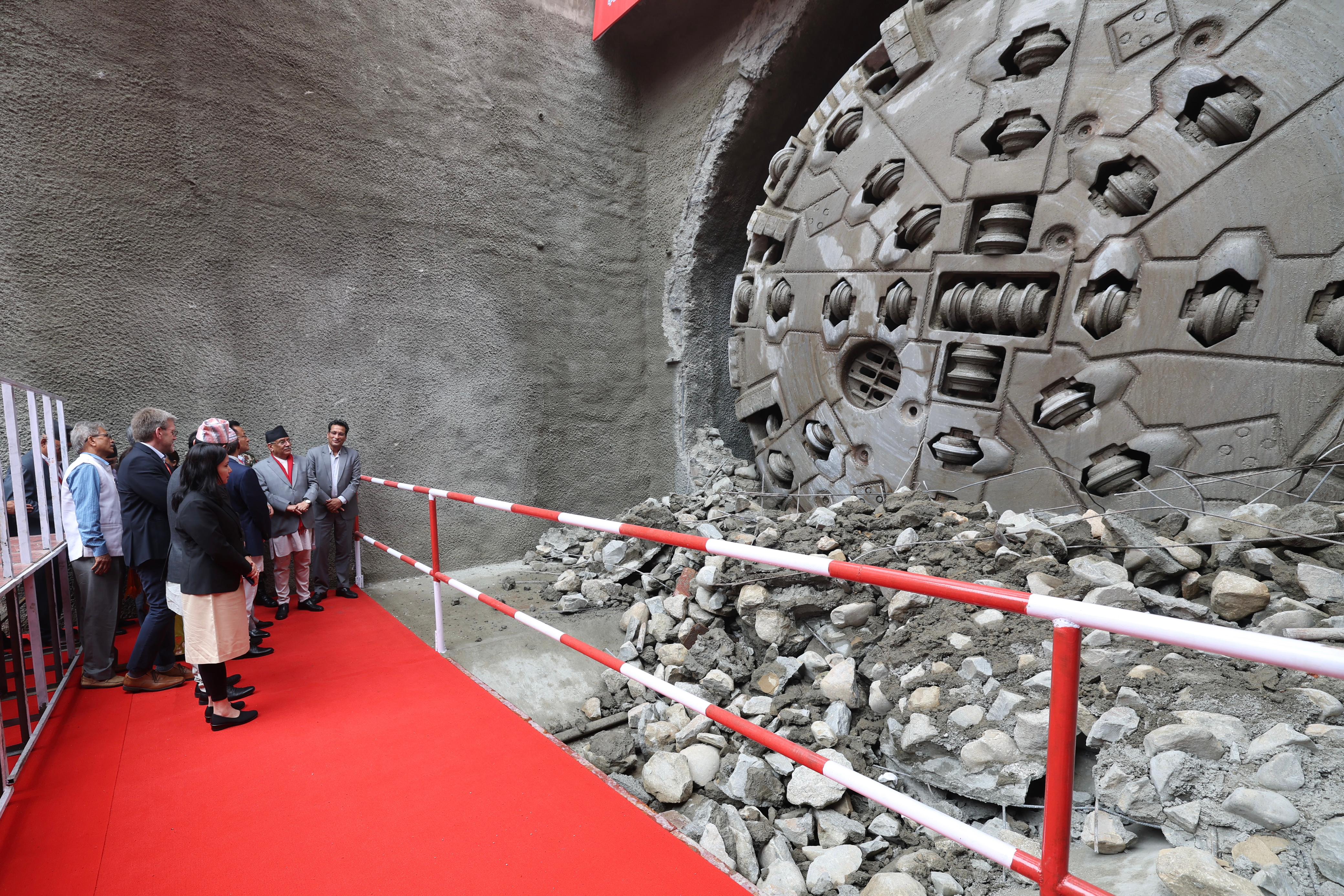"Enough is enough"
We use Google Cloud Translation Services. Google requires we provide the following disclaimer relating to use of this service:
This service may contain translations powered by Google. Google disclaims all warranties related to the translations, expressed or implied, including any warranties of accuracy, reliability, and any implied warranties of merchantability, fitness for a particular purpose, and noninfringement.


On Thursday morning, a left-wing friend asked – 'What kind of person do you think Prachanda is?' Prachanda's personality has been inaccessible to everyone so far. No one among contemporary politicians has been able to 'beat' him.



No one can deny the fact that Prachanda defeated both Nepali Congress chairman Sher Bahadur Deuba, who is said to understand the local situation, and KP Sharma Oli, the chairman of Nepal Communist Party (UML), who has the ability to turn Nepali politics in his circle. Whether in power or out of power, Prachanda's active politics has become the main stream of current Nepali politics. Since the declaration of the Republic of Nepal on May 15, 2065, Nepali politics has been Prachanda centered.
After the first election for the Constituent Assembly, Prachanda's image was different when he was the Prime Minister. It was only natural that he removed Army Chief General Rukmangad Katwal. Because, the Maoists came to the path of peace by accepting the change achieved by the power of the people's movement in collaboration with the political parties and not by the power of agreement. After the comprehensive peace agreement signed between Prime Minister Girija Prasad Koirala and Chairman of the Communist Party of Nepal (Maoist) Pushpa Kamal Dahal Prachanda on 5th November 2063, Maoists were established as major players in Nepali politics.
Maoists won as the largest party in the Constituent Assembly elections held after the declaration of the Republic. Prachanda's journey that started after that has been very ups and downs. As the first powerful executive head of republican Nepal, Prachanda could not accept the status quo. During this he decided to relieve the Chief of Army Staff Rukmangad Katwal. However, the then President Ramvaran Yadav did not want to understand the changing aspirations of a changing Nepal. As the constitutional head of the army, he did not take the role of Katwal Chief Saheb. Katwal's retirement from the army was a clear and direct sign of a radical change in the country for the Nepali people. This event would be recorded in history as the epilogue of the end of autocratic monarchy from Nepal.
After the promulgation of the republican constitution in the country, a coalition government of Maoists and Congress was formed under the leadership of Maoist Chairman and Prime Minister Prachanda. It was a good example of Congress-Maoist cooperation. Then some dramatic events happened in politics. The 'institutional unity' between Maoists and UML has collapsed. Maoist returned to Paris to revive his existence.
The events after that are very interesting. It is certain that the level of the Congress-Maoist coalition government formed this time is a little lower than the average. Congress ministers who are at the level of government administration forgot the fact that the government was formed under the leadership of Prachanda. The information that the Prime Minister was not satisfied with the 'performance' of the then Finance Minister Prakasharan Mahat was being made public. However, Prime Minister Prachanda and Congress President Deuba agreed. From the day the decision to form the government was made to the day before the alliance collapsed, the relationship between them was cordial. President Deuba's trust in Prime Minister Prachanda was awakened, but Prime Minister Prachanda had made more efforts to get 'national consensus' to install senior Congress leader Ramchandra Paudel in the post of President.
This effort of Prime Minister Prachanda was very pleasant for Chairman Deuba, who clearly understood that his leadership in the Congress would not be safe until Paudel, the most senior leader of the party, was stopped. Prachanda's efforts also brought results as desired by Deuba. Paudel was constitutionally elected to the highest but figurative post in an honorable manner. Congress President Deuba thought that after the leader who could compete with him in the party was kept in a respectable position, the chances of rising against him in the party were relaxed. However, this was his wrong assessment.
After Deuba and Prachanda decided to form a coalition government together with Congress-Maoist, some ambitious leaders of Congress celebrated in a famous restaurant on Darbar Marg. After that euphoria, it seemed, the Congress has moved on the path of practical politics. Purna Bahadur Khadka, who was assigned to represent the Congress in the new government, became the Deputy Prime Minister and Defense Minister with the second rank after the Prime Minister in the coalition government. The Finance Ministry was given to Prakasharan Mahat. Mahat, trained in the US and having a degree in economics, is the brother of well-known economist and senior Congress leader Ram Sharan Mahat. But, definitely not Ramsharan. If the subject or the context does not have another meaning, he wants to be only the 'Yesman' of Chairman Deuba.
Prime Minister Prachanda gave the responsibility of Home Minister to senior leader of his own party, Narayankaji Shrestha. Chairman Deuba did nothing in this regard. No matter how much the Prime Minister Prachanda talked about development and reform, the government was still running at a slow pace in its own Nepalese way.
In recent developments, Prachanda and Deuba were trying to reform the coalition government in order to reduce the growing public anger towards the coalition government. In the meeting of the Congress General Committee held in Godavari, Deputy Prime Minister and Defense Minister Purna Bahadur Khadka, who is considered to be the most liberal and knowledgeable, read out a written speech explaining the futility of people's war in a language that everyone could understand. Why did Khadka, who was also the vice-chairman of the party, play such a flute out of season? He knows that. However, Prime Minister Prachanda was shocked by Khadka's speech. He suspected that the Congress was becoming uncooperative in the agenda of the detailed peace agreement and republicanism, federalism, secular society and proportional inclusion character of the state as determined by the republican constitution of Nepal. It is unfortunate that the Congress, which has been fighting continuously for more than seven decades for secularism and rule of law in the country, is now on the path of ejaculation.
Prime Minister Prachanda sometimes dances. He likes to dance. He danced in the streets with popular actress Rekha Thapa during the protests against the Madhav Nepal-led government. Last time in Pokhara, a video of him dancing to Prakash Saput's song 'Galbandi Chatio' went viral on social media. Such interesting and miraculous spectacles are not unusual for politicians.
In the current context, the country's intellectuals do not want to doubt Prime Minister Prachanda's commitment to the agenda of the Maoist People's War and the 2062-63 movement, such as republicanism, federalism, secularism and proportional inclusion of the state. According to former speaker and political thinker Damannath Dhungana, other democrats and left-wing leaders apart from Prachanda have separated from this agenda. Even as a leader and as Prime Minister, Prachanda cannot be separated from these agendas.
Analysts say - After Narendra Modi government's slogan of Hindutva in India is likely to win the upcoming elections, a group within the Nepali Congress is trying to bypass the political divide by grasping the Hindu agenda. This mentality is also expanding within the UML. However, no country or society has been entangled in the politics of religion and caste. The demand of today's time is to inspire the people who have been rendered almost helpless and neglected by the state in the work of development. There are no other options. There is no commitment to build the country in the leaders who complain and complain on social media. This is not a problem today. In 2007, the Rana rule came to an end. Even after that many changes happened. However, no change has been able to erase the shadow of feudal power till date.
In this current situation, the Maoist party led by Prachanda in turn forming a coalition government with the Congress and the UML is just a daydream. Prime Minister Prachanda understands this very well. He definitely has time awareness. The current UML-Maoist alliance is not on the way to last. UML is a 'conservative' force in the guise of the Left. The Maoists' association with this power does not seem to last long. One option left before Prachanda is the announcement of mid-term elections. This is the best time for it. At a time when the institutions of government are lax and misguided, the mid-term announcement is unlikely to be challenged. Enough is enough.
प्रकाशित : चैत्र १६, २०८० ०८:४८

 २१.१२°C काठमाडौं
२१.१२°C काठमाडौं















